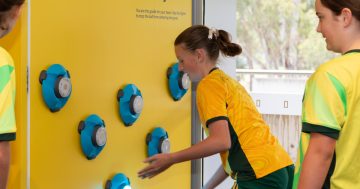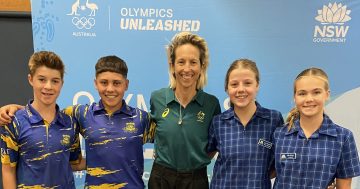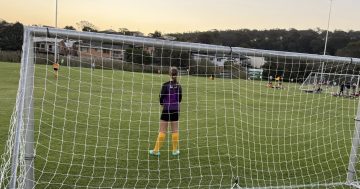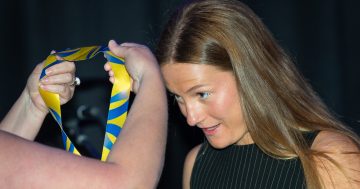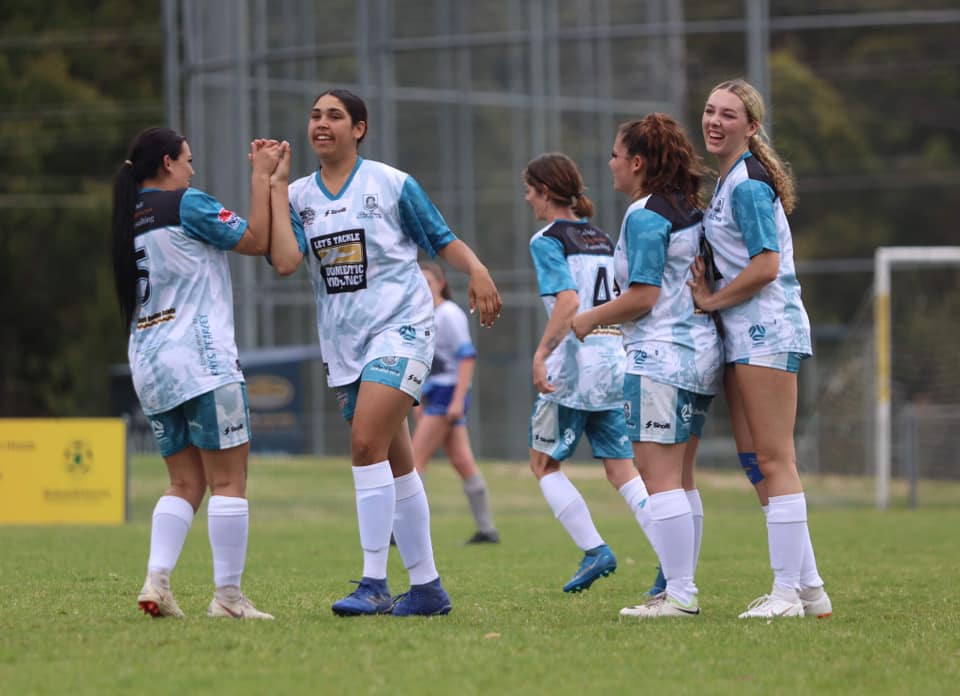
Celebrating Indigenous women’s talent on the soccer field, the Rhys Pearcey Memorial Women’s Football Team. Photo: Supplied.
The Matildas’ spectacular World Cup performance shone a spotlight on the quality of women’s soccer in Australia – but how many potential Indigenous Matildas are lost because of financial and social barriers?
Ngarigo and Djiringanj woman Tamika Townsend is determined to give Indigenous women in the ACT and South Coast the chance to showcase their talents each year at the NSW First Nations Football Festival.
“We know our women are some of the most economically disadvantaged in the country, and one flow-on effect of that is missed opportunities in sport,” she said.
“Soccer lags behind other codes in terms of Indigenous representation.
“We make up 17 per cent of grassroots NRL, 12 per cent of contracted players, but less than one per cent of grassroots soccer, but the talent our girls have is so bloody good.”
She founded the Rhys Pearcey Memorial Women’s team in 2018 – although it wasn’t called that at the time.
Her late partner, Rhys Pearcey, was instrumental in the formation of the team, and coached and supported the side in their 2018 and 2019 campaigns.
“He was a huge supporter of women’s sports and women in general, he was a proud feminist,” she said.
“In 2018 I was living in the ACT and came across the First Nations Football Festival and really wanted to play, but there was no team in the area. I talked to Rhys about it and he said, ‘Why don’t you start a team?’
“We started to look for players and got the numbers together, but then I worried people would have to pull out because of the financial cost of travel and accommodation – the tournament runs over several days.
“I didn’t want to be part of a team where people missed out because of their background, so we started to look for sponsorships, and Capital Football supported us.
“If Rhys hadn’t suggested it, I never would have done it.”
The side drew players from Tamika’s roots on the South Coast, as well as ACT talent.
She said the connections between the regions had existed since before colonisation through the Bundian way – a route between the coast and capital region.
Meet-ups to trade, share stories and celebrate were common, and the team is a continuation of that connection and cultural legacy.
“It’s something we look forward to all year, being surrounded by culture and mob,” she said.
In their first year at the festival the side placed third, and everyone was keen to have another crack in 2019.
While they didn’t place as highly as the first year, they still kicked some big goals.
Two members of the squad – Shaq Chong and Jem Gilbert – were selected for the national Indigenous women’s soccer team.
Women’s soccer in the ACT also saw an increase in Indigenous players, as members of the squad looked for opportunities to train more regularly.
“Rhys was there for that one as well, our daughter Rose was five months old at the time,” Tamika said.
“He was always helping out, coaching, revving everyone up, and supporting me through all the organisation side of it.”
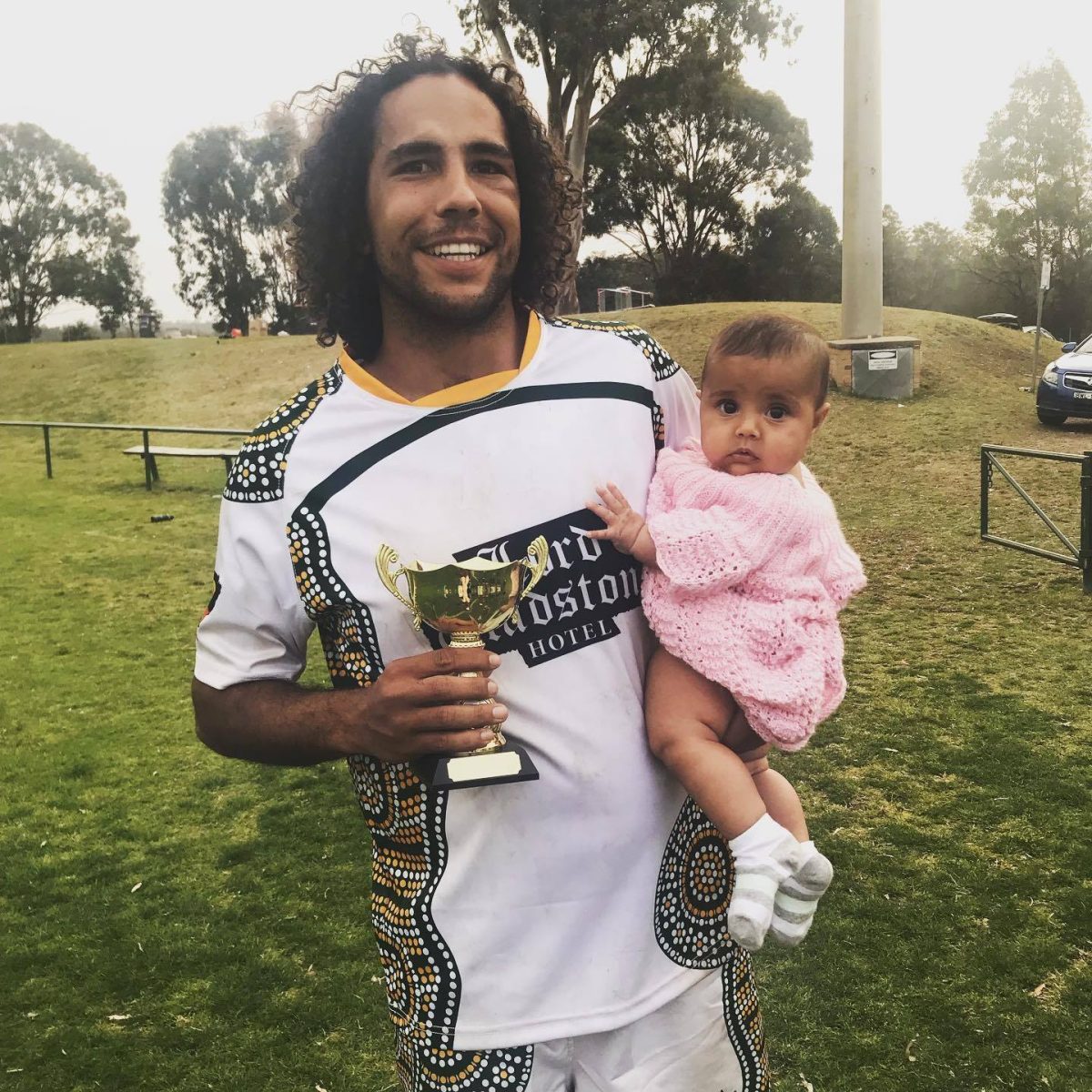
The late Rhys Pearcey with his daughter Rose. Photo: Supplied.
A couple of months later in December, Rhys, 28, was killed when his car hit a tree off the Princes Highway.
He left behind countless devastated friends and family, and an enormous hole in the fabric of the South Coast community from Bega to Wollongong he was so passionate about supporting.
The football festival was put on hold during the COVID-19 pandemic; when it returned in 2022 Tamika and the rest of the team were determined to continue in Rhys’ memory.
“It was our first tournament without Rhys, so we renamed the team the Rhys Pearcey Memorial Women’s Team,” Tamika said.
“His family came and presented the jersey, his son Luther was there, his daughters were there.
“It’s become a huge family and the girls support each other year-round.
“It’s built a network of strong Indigenous women who are leaders in their own right, who mentor each other and let each other know about opportunities, and that reflects the way Rhys brought people together.
“We’re determined to keep coming together to remember Rhys, and the dream is that all our kids will be playing in it one day.”
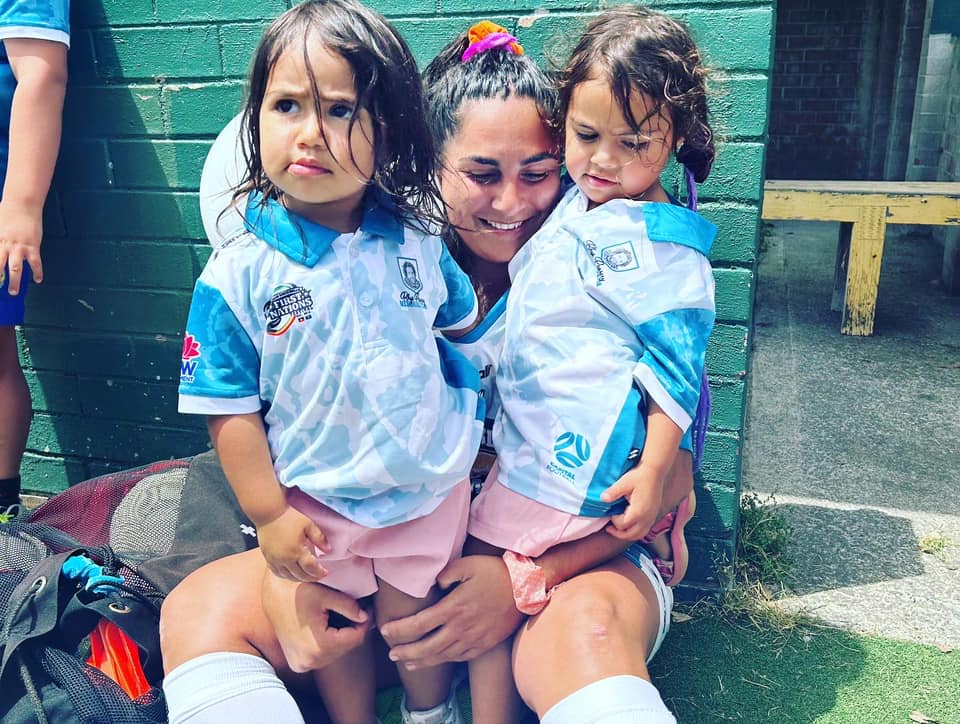
Rhys’ daughters, Rose and Zali, look on from the sidelines. Photo: Supplied.
Working out the logistics for the side each year is a labour of love for Tamika and the team volunteers, including stalwarts Ronnie Jordon and Sherrin Morgan.
But after a major sponsor pulled out this year, it’s become that bit more challenging.
She’s determined the side will continue to embody Rhys’ ethos of fairness and inclusion, and that players won’t miss out because of the financial cost of participation.
“It’s so important to us that no matter your background, your job, where you’re from, the culture of the team is everyone gets the opportunity to participate, no one misses out, no one needs to be ashamed,” she said.
“That’s at the core of why we began.
“We have all this talent and only two Indigenous women playing at a national level. If the industry got serious about increasing Indigenous representation they’d find so much talent at this competition, it’s so worthwhile to invest in.”
While some additional funding for grassroots football would be welcome, the side currently needs sponsorship ahead of the festival in November.
They’re holding a fundraising trivia night at the Queanbeyan Hotel on 1 September, which will include special guest performances from The Djidjarns singing in Ngarigo language, Ngunnawal dancers led by Tiana House and 2020 Australian of the Year Katrina Fanning as a keynote speaker.
Prizes include traditional Aboriginal artworks, boots donated by State of Origin/Sharks player Dale Finucane, artwork by Yalga Arts, Victorian Katunga wines and traditional weaving from Culture on the Move.
Coolamon Advisors and Jive Strategic Property Consultants have thrown their support behind the side as well.
Tickets for the trivia night are available here. Donations of prizes for the trivia night are also welcome via their Facebook page, or make a direct donation here.







